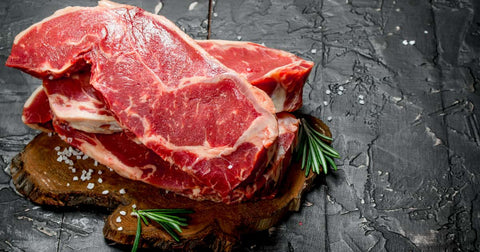Steak, a culinary delight enjoyed worldwide, can be a delicious and nutritious source of protein. However, improper handling or undercooking can lead to food poisoning. If you've recently experienced digestive upset after consuming steak, you might be wondering, "Can you get food poisoning from steak?"
This comprehensive guide will delve into the potential risks of food poisoning from steak, explore safe cooking practices, and discuss how food intolerances might contribute to digestive issues.

Understanding Food Poisoning
Food poisoning occurs when you consume food contaminated with harmful bacteria, viruses, or parasites. These pathogens can multiply in your digestive system, causing a range of symptoms, including nausea, vomiting, diarrhea, and abdominal cramps.
Can You Get Food Poisoning from Steak?
Yes, you can definitely get food poisoning from steak. Raw or undercooked steak can harbor harmful bacteria, such as Salmonella, E. coli, or Campylobacter. These bacteria can survive on the surface of the meat or even within the muscle tissue if the steak hasn't been cooked to a safe internal temperature.
Is Rare Steak Safe?
The safety of rare steak depends on several factors:

-
Quality of the meat: High-quality steak from a reputable source is less likely to be contaminated.
-
Handling and storage: Proper handling and storage are crucial to prevent bacterial growth.
-
Cooking temperature: The internal temperature of the steak must reach at least 145°F (63°C) to kill harmful bacteria.
Undercooked Steak: The Risks
Consuming undercooked steak increases your risk of food poisoning. The severity of symptoms can vary depending on the type of bacteria, the amount consumed, and your overall health.
What Happens if You Eat Bad Steak?
If you eat steak contaminated with harmful bacteria, you might experience:

-
Nausea and vomiting
-
Diarrhea
-
Abdominal cramps
-
Fever
-
Headache
-
Fatigue
In severe cases, food poisoning can lead to dehydration, hospitalization, or even long-term health complications.
Is Food Poisoning Contagious?
Food poisoning itself is not contagious, but the bacteria or viruses that cause it can be. If you have food poisoning, it's important to practice good hygiene, such as washing your hands frequently, to avoid spreading the infection to others.
Food Poisoning Contagious: Preventing the Spread
Proper food handling and hygiene practices are essential to prevent the spread of food poisoning:
-
Wash your hands thoroughly before and after handling raw meat.
-
Cook steak to a safe internal temperature.
-
Avoid cross-contamination: Don't use the same utensils or cutting boards for raw meat and other foods.
-
Refrigerate leftovers promptly.
Food Intolerance and Digestive Issues

If you experience digestive discomfort after eating steak or other foods, even when they are properly cooked, consider the possibility of a food intolerance or sensitivity. These can trigger inflammation and digestive upset.
A food sensitivity test kit can help you identify specific foods that might be causing your symptoms. By eliminating or reducing these trigger foods, you can potentially alleviate your digestive problems and improve your overall gut health.
Key Takeaways:
-
You can get food poisoning from steak if it's not cooked properly or has been contaminated with harmful bacteria.
-
Ensure your steak reaches a safe internal temperature of 145°F (63°C) to kill bacteria.
-
Practice good hygiene and food handling to prevent food poisoning.
-
If you experience digestive issues after eating steak, consider a food sensitivity test to identify potential food intolerances.
Remember, this article is intended for informational purposes only and should not be considered a substitute for professional medical advice. If you have any concerns about your health or suspect food poisoning, consult a qualified healthcare professional.
Frequently Asked Questions:
1. How can I tell if my steak is cooked to a safe temperature?
Use a meat thermometer to check the internal temperature of your steak. It should reach at least 145°F (63°C) for medium-rare, 160°F (71°C) for medium, and 170°F (77°C) for well-done.
2. What are the symptoms of food poisoning from steak?
Symptoms can include nausea, vomiting, diarrhea, abdominal cramps, fever, and headache. These symptoms typically appear within a few hours to a few days after consuming contaminated steak.
3. I think I have food poisoning from steak. What should I do?
Stay hydrated by drinking plenty of fluids, especially water and electrolyte drinks. Rest and avoid solid foods until your symptoms improve. If your symptoms are severe or persistent, or if you have signs of dehydration, seek medical attention promptly.
4. Can I still eat steak if I have a sensitive stomach?
If you have a sensitive stomach, it's best to choose lean cuts of steak and avoid fatty or greasy preparations. Ensure the steak is cooked thoroughly to a safe internal temperature. If you experience digestive issues after eating steak, consider a food sensitivity test to rule out any intolerances.
5. How can I prevent food poisoning from steak?
Practice safe food handling and cooking practices. This includes washing your hands thoroughly before and after handling raw meat, cooking steak to a safe internal temperature, avoiding cross-contamination, and refrigerating leftovers promptly.


.png?v=1737390083)
.png?v=1737187409)


